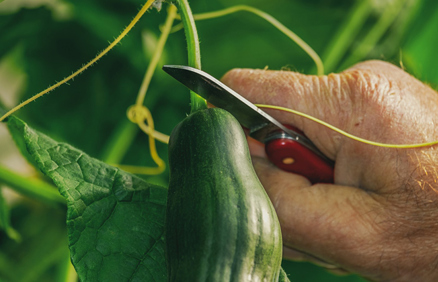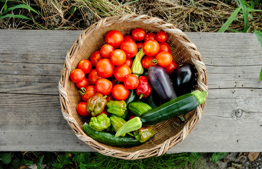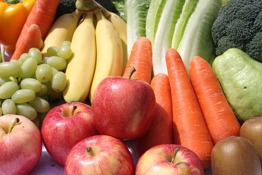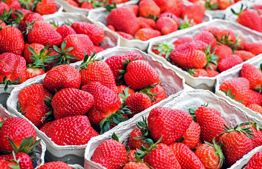Separating terumot and ma'aserot from one year to the next

Is it permissible to separate terumot and ma'aserot from tomatoes or cucumbers that were picked before Rosh Hashana to exempt tomatoes/cucumbers picked after Rosh Hashana of years 4 and 5 (or 1 and 2) of the shemita cycle, since produce from both years are subject to ma'aser sheni?
The Mishna in tractate Rosh Hashana (1:1) states: "The first of Tishrei is the New Year for years, the sabbatical years, the jubilee years, and for planting vegetables." The practical significance of Rosh Hashana being the New Year for vegetables is tied to the words of the Mishna (Terumot 1:5): "One does not separate teruma … from the new to exempt the old, or from the old for the new…and if one separates teruma this is not considered teruma."
This halacha is grounded in the verse (Devarim 14:22): " עַשֵּׂר תְּעַשֵּׂר אֵת כָּל תְּבוּאַת זַרְעֶךָ הַיֹּצֵא הַשָּׂדֶה שָׁנָה שָׁנָה". Chazal learn from here (Sifri §105): "Year by year—to indicate that one does not tithe from one year to exempt the next; this only indicates ma'aser sheni, which is what the [text] is referring to. How do we know that this includes all other tithes? We learn this from the [repeated] words aser te'aser." (We see a similar interpretation in tractate Bechorot 53b, see Rashi, incipit. ma ma'aser).
The practical implications of the first of Tishrei being the new year for vegetables relates to their harvest during this time of the year, since the stage that determines the ma'aser year for vegetables is their harvest (lekita). For this reason, vegetables harvested prior to Rosh Hashana belong to the previous year, so they are considered "old," while those harvested after this date belong to the new year and thus are "new." What follows is that terumot and ma'aserot cannot be taken on vegetables harvested on the last day of Elul of one year to exempt vegetables harvested after Rosh Hashana (or vice-verse). As the Gemara states (Rosh Hashana 12a-b): "
,ליקט ירק ערב ראש השנה, עד שלא תבוא השמש, וחזר וליקט משתבוא השמש - אין תורמין ומעשרין מזה על זה"
"לפי שאין תורמין ומעשרין לא מן החדש על הישן ולא מן הישן על החדש
The Sages taught: If one picked vegetables on the eve of Rosh Hashana before the sun had set, so that they belong to the previous year, and returned and he picked after sunset, one may not set aside teruma and tithe from the one to the other, as one may not set aside teruma and tithe from the new [crop] for the old nor from the old [crop] for the new.
Note the comment of the Radbaz (Terumot 5:11) that while the verse states "עשר תעשר...היוצא השדה שנה שנה" and this is where we learn not to tithe from one year to exempt the next, and this refers specifically to ma'aserot, the Gemara applies this also to terumot. The reason for this is that we learn many laws about teruma from ma'aser, and vice-versa.
Taking teruma and ma'aser from one year to exempt another does not work even bedi'avad
The question is: what happens after-the-fact? The Mishna (Terumot 5:5) states clearly that "if one separates teruma, it is not considered teurma." That is, even bedi'avad one cannot separate teruma from vegetables harvested before Rosh Hashana to exempt those harvested following Rosh Hashana. The Rambam (Hilchot Terumot 5:11) and the Shulchan Aruch (YD §331:57) rule accordingly:
,אין תורמין מפירות שנה זו על פירות שנה שעברה, ולא מפירות שנה שעברה על פירות שנה זו"
" 'ואם תרם אינה תרומה, שנאמר: 'שנה שנה
The Shulchan Aruch also rules in this manner (ibid., §331:155) in relation to taking ma'aser from vegetables of one year to exempt the next year.
Harvest: actual harvest or fully developed (gemar peri)?
For vegetables such as tomatoes, which are fully ripe before harvest, the Rishonim were divided on the determining stage for terumot and ma'aserot.
From the Gemara (Rosh Hashana 12a), it seems that the determining state for the ma'aser year governing vegetables is the harvest, which is why we cannot tithe from vegetables from one year for the next (as we mentioned above). The Shulchan Aruch essentially quotes the Gemara when ruling: "If one harvests a vegetable Rosh Hashana eve until sunset, and then harvests again after sunset, one cannot give teruma from [the first] to [the second], since this is new and that is old … since the first of Tishrei is the New Year for tithes of grains, legumes, and vegetables.
However, according to the Tosafot (Rosh Hashana 13b, incipit. Achar gemar haperi), it seems that "harvest" does not necessarily relate to the actual harvest, but rather the final ripening stage of the vegetable, referred to in the Gemara as gemar peri (the fully developed fruit). Similar to the ruling for rice, poppy seeds, and sesame seeds, for which the gemar peri stage is the factor that determines which year they belong to (Rambam Hilchot Ma'aser Sheni 1:8). The Tosafot write that this is true also for vegetables:
"Also for vegetables the determining factor is the ripening of the fruit; however the Gemara states that the determining time is the harvest, since harvest follows immediately after the vegetable's ripening."
The reasoning of the Tosafot is that it cannot be that the stage determining vegetables' ma'aser year is a random act dependent on a person's action (or inaction). For this reason, they maintain that the "harvesting" stage for fruit is independent of people, but rather it is the stage when vegetables can be harvested, which coincides with the stage of gemar peri for rice and the like. This is similar to the stage of chanata (blooming) for fruits, which is a significant benchmark in the fruit's development, just as hava'at shelish (a third of growth) for grains and legumes are also important stages in their development.
The conclusion we can draw from the Tosafot is that if a person harvests tomatoes from the same plant before and after Rosh Hashana, but the post-Rosh Hashana tomatoes were ripe and worthy of harvest erev Rosh Hashana, the Tosafot maintain that it would be possible to tithe from one group of tomatoes to exempt the second group.
In practice, since the Rambam and the Shulchan Aruch rule that the person's harvest is what determines the year the vegetables belong to, in any case we do not take terumot and ma'aserot from vegetables harvested before Rosh Hashana to exempt those harvested afterwards.
For farmers, this issue is much more prevalent; often they harvest produce right before Rosh Hashana and refrigerate it so they can sell the vegetables right after Rosh Hashana. The percentage for terumot and ma'aserot they bring to the packing house from the grade B vegetables harvested right before sales on Tzom Gedalia. In this case, If the terumot and ma'aserot are taken from the Tzom Gedalia harvest, the separation of terumot and ma'aserot will not be effective since it is taking from one year for the next.
Practical recommendations:
- If there is a need to harvest prior to Rosh Hashana and sell following Rosh Hashana, farmers should make sure they take ma'aserot from the produce harvested before Rosh Hashana.
- Likewise, vegetables harvested after Rosh Hashana should not have terumot and ma'aserot taken from the refrigerated vegetables from before Rosh Hashana.
- Packing houses that receive merchandise from farmers and will not be able to verify whether terumot and ma'aserot were performed following the guidelines above should ensure that the merchandise reaches them before Rosh Hashana, and take terumot and ma'aserot before this date.




